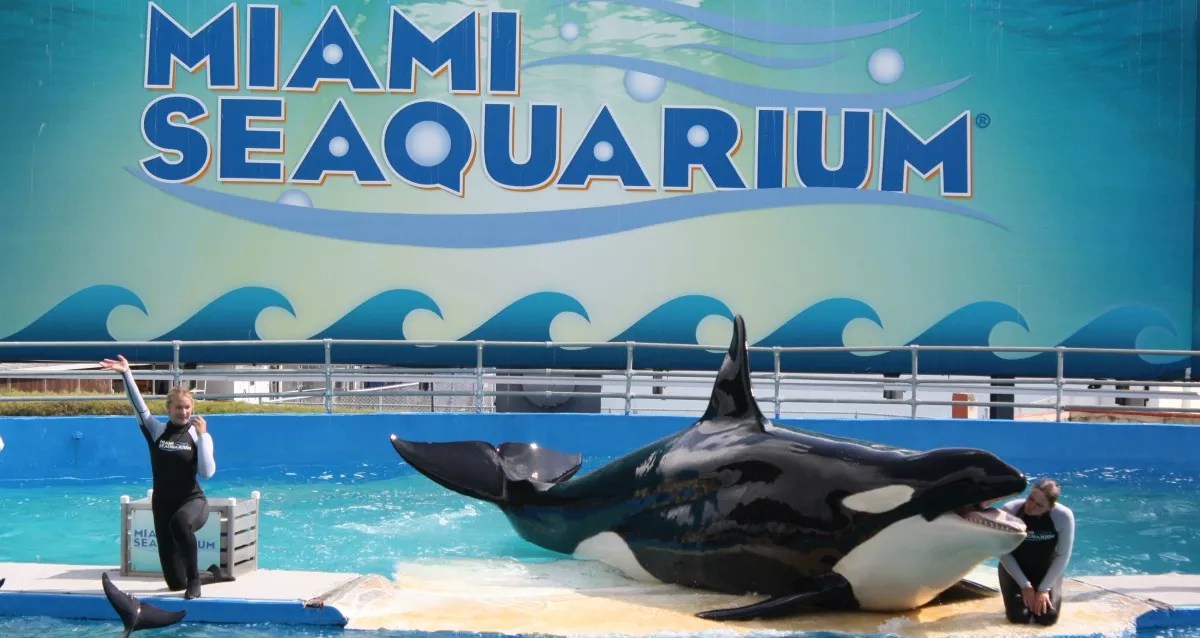
Photo by Leonardo DaSilva / Flickr

Audio By Carbonatix
For 47 years, the 21-foot orca Lolita has lived inside concrete walls and a flimsy tin ceiling. Despite protests from local and national activists, Miami Seaquarium has claimed her tank is a safer option than transferring her to a sea pen in her native Pacific Northwest.
Now Miami Beach’s elected officials have joined the push to release the whale after Lolita was left in her tank during Hurricane Irma, drawing more scorn from online activists.
Last week, the Miami Beach City Commission voted unanimously on a resolution urging the Seaquarium to release the orca from captivity. The proposal is only symbolic because the Seaquarium is located on Virginia Key, but Miami Beach officials are asking the park to retire Lolita into the care of the Orca Network, a nonprofit based in Freeland, Washington, which has had plans for how to retire the creature since 1995.
The Seaquarium slammed the Beach’s vote and insisted Lolita is safer at the marine park than she would be in a sea enclosure. “We are saddened by this political stunt which is being made by someone who has no knowledge caring for marine mammals,” the park says in a statement, adding that “it would be reckless and cruel to treat her life as an experiment and jeopardize her health and safety in order to appease a fringe group.”
When Lolita was 4 years old, she was separated from her family and moved to the Seaquarium, a 38-acre theme park operated by Palace Entertainment, an offshoot of Spanish conglomerate Parque Reunidos Servicios Centrales. She had come from a population of orcas that has been listed as endangered since 2005.
“As a survivor, Lolita is an outlier,” says Howard Garrett, cofounder of Orca Network and one of the original drafters of Lolita’s retirement plan. “All the other orcas that were captured in the 1960s and 1970s died by 1987. She’s the last one surviving.” Lolita’s former tank mate, Hugo, killed himself in 1980 by repeatedly smashing his head into the walls of the tank.
For decades, she performed dutifully even as protests grew, reaching a fever pitch in recent years thanks to the documentary Blackfish. In September, as Hurricane Irma whipped through Florida, Lolita was left in a 20-foot-deep enclosure with only a tin roof above her. Seaquarium officials argue that moving her would have been more harmful than letting her ride out the storm, but some experts disagree.
“She should have been moved, no questions asked,” former SeaWorld trainer Dr. Jeffrey Ventre says. “It was criminal animal negligence or animal cruelty.”

Protesters rally for Lolita the orca’s release from Miami Seaquarium.
Photo by Monica McGivern
Though Lolita was apparently unharmed, critics contend that if Irma had hit Miami directly, the whale would have been vulnerable to potentially fatal injuries from flying debris, blunt force trauma, extreme stress and PTSD, and exposure to highly contaminated floodwater.
A recent report by the U.S. Department of Agriculture’s inspector general also concluded that Lolita’s tank “may not meet all space requirements defined by the agency’s [Animal Welfare Act] regulations,” contradicting a previous 1999 ruling by the USDA.
Citing all of those reasons, Miami Beach Mayor Philip Levine drafted a resolution urging the city commission to call on the Seaquarium to retire Lolita and and release her into Orca Network’s care. “We have the opportunity to show a united front with mayors from across Florida saying it’s time to retire Lolita and return her to her natural habitat,” he said.
Last Tuesday, the commission unanimously passed the resolution.
Levine then began sending letters to city and county officials across the state, urging them to pass similar resolutions. In his letter, he quoted Mahatma Gandhi: “The greatness of a nation and its moral progress can be judged by the way its animals are treated.'”
“Any delay to [Lolita’s] release is further risk to her health,” says Garrett, who’s been campaigning for the orca’s return to her native habitat for more than 20 years. Decades ago, he drafted a retirement plan for Lolita, which includes a step-by-step protocol for her safe transfer to a seaside sanctuary in Washington state’s San Juan Islands, near Lolita’s original home in Puget Sound.
The procedure, which would take about six to eight weeks, would involve Lolita swimming into a comfortable sling, which would lift her into a filled tank on a flatbed truck. The truck would transport her to a large aircraft, on which she would be flown across the country and eventually unloaded onto a barge. Finally, she would be towed out to a sea pen and gently transferred into the native waters. A veterinary staff would closely observe and rehabilitate her until she could be released from the cove and given the opportunity to reunite with her family.
“There’s every indication that Lolita remembers her family,” Garrett says. “She still uses the calls, a unique set of whistles, that her family used to communicate when she was growing up. Even now, virtually every night, she calls to them.”
But Seaquarium officials insist Garrett and his allies are wrong about the captive orca. “There is no scientific evidence that the 50-year-old, post-reproductive Lolita could survive if she were to be moved from her home at Miami Seaquarium to a sea pen or to the open waters of the Pacific Northwest,” the park says in a statement.
Instead, the Seaquarium suggests that anyone concerned with Lolita’s welfare should concentrate on issues such as overfishing, boat noise, and chemical runoff polluting orca habitats. “They should not focus on a whale that is thriving in her environment in Miami,” the park says.
Garrett, however, says Lolita’s longevity is not a testament to the quality of her life at the Seaquarium. “It’s a Catch-22,” he says. “She’s survived this long because of her remarkable patience and strength. Now they’re using it against her.”